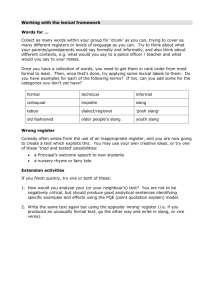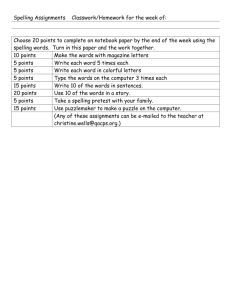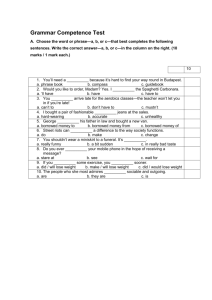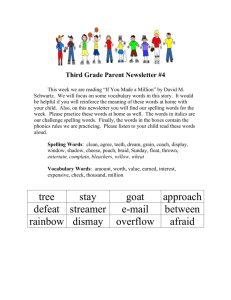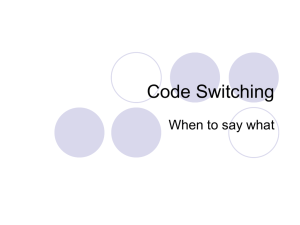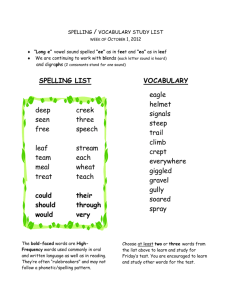Part 1 Basic concepts of Words and Vocabulary Before we attempt
advertisement
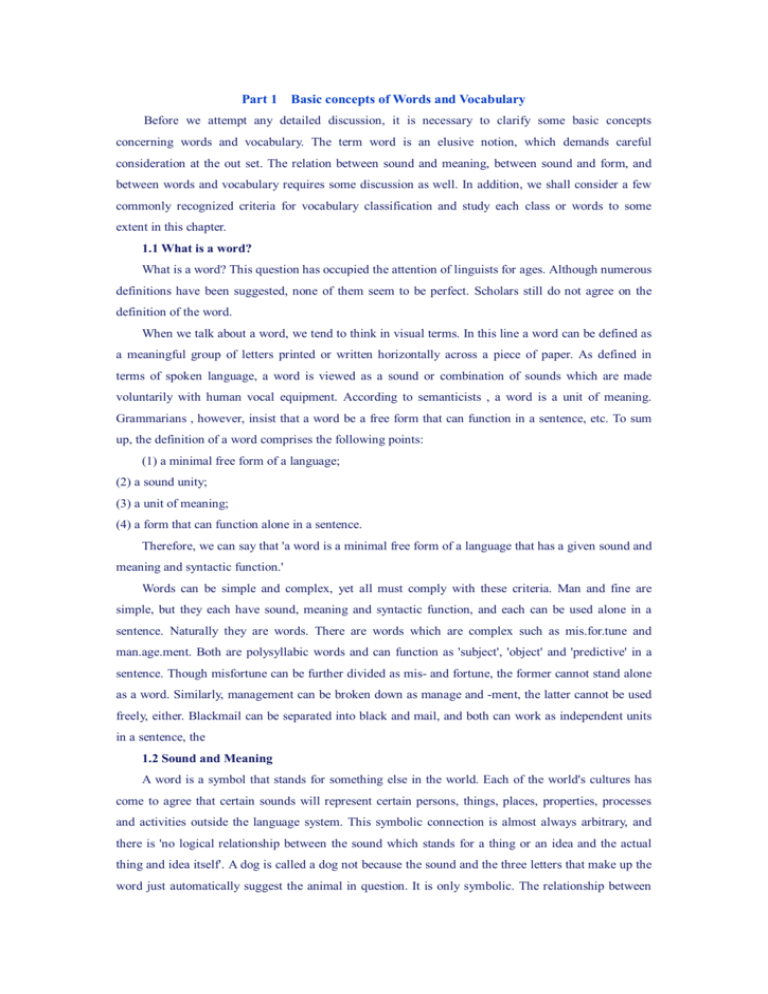
Part 1 Basic concepts of Words and Vocabulary Before we attempt any detailed discussion, it is necessary to clarify some basic concepts concerning words and vocabulary. The term word is an elusive notion, which demands careful consideration at the out set. The relation between sound and meaning, between sound and form, and between words and vocabulary requires some discussion as well. In addition, we shall consider a few commonly recognized criteria for vocabulary classification and study each class or words to some extent in this chapter. 1.1 What is a word? What is a word? This question has occupied the attention of linguists for ages. Although numerous definitions have been suggested, none of them seem to be perfect. Scholars still do not agree on the definition of the word. When we talk about a word, we tend to think in visual terms. In this line a word can be defined as a meaningful group of letters printed or written horizontally across a piece of paper. As defined in terms of spoken language, a word is viewed as a sound or combination of sounds which are made voluntarily with human vocal equipment. According to semanticists , a word is a unit of meaning. Grammarians , however, insist that a word be a free form that can function in a sentence, etc. To sum up, the definition of a word comprises the following points: (1) a minimal free form of a language; (2) a sound unity; (3) a unit of meaning; (4) a form that can function alone in a sentence. Therefore, we can say that 'a word is a minimal free form of a language that has a given sound and meaning and syntactic function.' Words can be simple and complex, yet all must comply with these criteria. Man and fine are simple, but they each have sound, meaning and syntactic function, and each can be used alone in a sentence. Naturally they are words. There are words which are complex such as mis.for.tune and man.age.ment. Both are polysyllabic words and can function as 'subject', 'object' and 'predictive' in a sentence. Though misfortune can be further divided as mis­ and fortune, the former cannot stand alone as a word. Similarly, management can be broken down as manage and ­ment, the latter cannot be used freely, either. Blackmail can be separated into black and mail, and both can work as independent units in a sentence, the 1.2 Sound and Meaning A word is a symbol that stands for something else in the world. Each of the world's cultures has come to agree that certain sounds will represent certain persons, things, places, properties, processes and activities outside the language system. This symbolic connection is almost always arbitrary, and there is 'no logical relationship between the sound which stands for a thing or an idea and the actual thing and idea itself'. A dog is called a dog not because the sound and the three letters that make up the word just automatically suggest the animal in question. It is only symbolic. The relationship between them is conventional because people of the same speech community have agreed to refer to the animal with this cluster of sounds. In different languages the same concept can be represented by different sounds. Woman, for example, becomes Frau in German, femme in French and fùn? in Chinese. On the other hand, the same sound [mi:t] is used to mean meet, meat, mete. Knight and night, though denoting entirely different things, yet have the same sound. 1.3 Sound and Form It is generally agreed that the written form of a natural language is the written record of the oral form. Naturally the written form should agree with the oral form. In other words, the sound should be similar to the form. This is fairly true of English in its earliest stage i.e. Old English. The speech of the time was represented very much more faithfully in writing than it is today. With the development of the language, more and more differences occur between the two. The internal reason for this is that the English alphabet was adopted from the Romans, which does not have a separate letter to represent each sound in the language so that some letters must do double duty or work together in combination. Another reason is that the pronunciation has changed more rapidly than spelling over the years, and in some cases the two have drawn far apart. During the last five hundred years, though the sounds of speech have changed considerably, there have been no corresponding changes of spelling. A third reason is that some of the differences were created by the early scribes. In the early days the spelling differences did not matter very much as people were not so used to seeing words in print, and the spelling was not fixed as it is today. As a result, no one was quite sure how some English words should be spelled. Sometimes, people deliberately changed spelling of words either to make a line even or for easier recognition. Before the printing press was brought to England, everything was written by hand. Those scribes, who made a living by writing for other people often worked in haste to meet the needs of the King, Church, and merchants. One problem was that several letters written with short vertical strokes such as i, u, v, m, w and n looked all alike. Consequently, their handwriting caused misunderstanding. To solve the problem in part, they changed the letter u to o when it came before m, n, or v. This is how sum, cum, wuman, wunder, munk came to be written as some, come, woman, wonder, monk. At some point, too, the scribes seem to have decided to change the spellings of words. In the late 1500, printing became well established. It helped to freeze the spelling of words. The standardization makes spelling sacred. Dictionaries did their share in stopping spelling changes. Meanwhile, sounds continued to change as usual, thus bringing more differences. Finally comes the borrowing, which is an important channel of enriching the English vocabulary. When English borrowed words from other languages, it borrowed spelling as well. The early borrowings were assimilated and the later ones, however, do not conform to the rules of English pronunciation and spelling, e.g. stimulus (L), dénouement (F), fiesta (Sp), eureka(Gr), and kimono(Jap). The written form of English is, therefore, an imperfect representation of the spoken form. From time to time in history, some British and American scholars have made efforts to reform the English spelling, but with little success. In spite of the differences, at least eighty percent of the English words fit consistent spelling patterns. And even those spellings that appear to be irregular may have more regularity and usefulness than we realize. In such words as hymn, condemn, bomb, for example, the last letter of each is silent. But when these words are extended into longer ones, the silent letters become audible: hymnal, condemnation and bombard. This is a general rule. 1.4 Vocabulary All the words in a language make up its vocabulary. The term 'vocabulary' is used in different senses. Not only can it refer to the total number of the words in a language, but it can stand for all the words used in a particular historical period, e.g. Old English vocabulary, Middle English vocabulary and Modern English vocabulary. We also use it to refer to all the words of a given dialect, a given book, a given discipline and the words possessed by an individual person. English is one of the world's highly developed languages. Naturally the vocabulary is one of the largest and richest. The general estimate of the present­day English vocabulary is over one million words. 1.5 Classification of Words The English vocabulary consists of words of all kinds. They can be classified by different criteria and for different purposes. Words may fall into the basic word stock and non­basic vocabulary by use frequency; into content words and functional words by notion, and into native words and borrowed words by origin. 1.5.1 Basic and non­basic vocabulary Basic word stock The basic word stock is the foundation of the vocabulary accumulated over centuries and forms the common core of the language. Though words of the basic word stock constitute a small percentage of the English vocabulary, yet it is the most important part of it. These words have obvious characteristics. 1. All national character . Words of the basic word stock denote the most common things and phenomena of the world around us, which are indispensable to all the people who speak the language. They include words relating to the following respects: Natural phenomena: rain, snow, fire, water, sun, moon, spring, summer, wind, hill; Human body and relations: head, foot, hand, face, father, mother, brother, sister, son, daughter; Names of plants and animals: oak, pine, grass, pear, apple, tree; horse, cow, sheep, cat, dog, chicken Action, size, domain, state: come, go, eat, hear, beat, carry, good, evil, old, young, hot, cold, heavy, white, black; Numerals, pronouns, prepositions, conjunctions: one, ten, hundred, I, you, your, who, in, out, under, and, but, till, as. These words cannot be avoided by any speaker of English, irrespective of class origin, education, profession, geographical regions, culture, etc. 2. Stability. Words of the basic word stock have been in use for centuries, e.g. man, fire, mountain, water, sun, moon. As they denote the commonest things necessary to life, they are likely to remain unchanged. Stability, however, is only relative. Actually, the basic word stock has been undergoing some changes. Words like arrow, bow, chariot, knight, rickshaw, which were common in the past, have now moved out of the word stock whereas such words as electricity, machine, car, plane, computer, radio, television, which denote new things and modern way of life, have entered the stock. But this change is slow. There are many more words joining in than dropping out. 3. Productivity. Words of the basic word stock are mostly root words or monosyllabic words. They can each be used alone, and at the same time can form new words with other roots and affixes, e.g. foot: footage, football, footpath, footer, foot­fall, footed, footloose, footling, footman, footbath, footing, footprint and many others. In the same way, dog is the father of doglike, doghood, dogcart, dog­cheap, dog­ear, dog­fall, dog­fight, doghole, dog paddle, dogsleep, to name just a few. Look at the word friend:friend, friendly, unfriendly, friendlessly, unfriendliness, friendship, friendlessness. 4. Polysemy. Words belonging to the basic word stock often possess more than one meaning because most of them have undergone semantic changes in the course of use and become polysemous. One example will suffice for illustration. The verb take may mean: to move or carry from one place to another; to remove or use without permission or by mistake; to seize or capture; to get for oneself; to get hold of (something) with the hands; to be willing to accept; to bear or endure; to need (a stated amount of time); to perform the actions connected with; to test or measure; to write down; to have the intended effect or to work successfully. 5. Collocability. Many words of the basic stock enter quite a number of set expressions, idiomatic usages, proverbial sayings and the like. Instances are numerous. Take heart for example: a change of heart; after one's heart; a heart of gold; at heart; break one's heart; cross one's heart; cry one's heart out; eat one's heart out; have one's heart in one's mouth; heart and hand; heart and soul; One's heart sinks within one; take something to heart; wear one's heart upon one's sleeve; with all one's heart and so on. Of course, not all the words of the basic word stock have these characteristics. Pronouns and numerals enjoy nation­wide use and stability, but are semantically monosemous and have limited productivity and collocability. Therefore, "all national character" is the most important of all features that may differentiate words of common use from all others. Non­basic vocabulary Words that do not have the stated characteristics belong to non­basic vocabulary of the language. They include the following: (1) Terminology consists of technical terms used in particular disciplines and academic areas as in medicine: photoscanning, hepatitis, indigestion, penicillin; in mathematics: algebra, trigonometry, calculus, in music: symphony, orchestra, sonata, concerto; in education: audiovisual, megauniversity, microteaching, etc. (2) Jargon refers to the specialized vocabularies by which members of particular arts, sciences, trades and professions communicate among themselves such as in business: bottom line for 'inescapable implication, unavoidable result, ultimate version', ballpark figures for 'estimate', bargaining chips for 'an advantage held by any of the parties in a negotiation'; in horse­racing: hold him back for 'prevent a horse from winning', hold him in for 'force a horse to run behind at the beginning of a race so as to reserve speed for the finish'; in medicine: paranoid for 'suspicious, worried', persona for 'mannerism', hypo for 'hypodermic syringe'; in warfare: buster for 'bomb'. Generally speaking, people outside the circle have difficulty in understanding such words. (3) Slang belongs to the sub­standard language, a category that seems to stand between the standard general words including informal ones available to everyone and in­group words like cant (shoptalk of any sub­group), jargon, and argot, all of which are associated with, or most available to, specific groups of the population. Certain words are labeled 'slang' not because of their appearance or pronunciation but because of their usage. Dough and bread, for instance, are standard when they are used as food terms but slang in the sense of 'money'. Similarly, grass and pot have standard or formal use meaning, respectively, i.e. 'type of plant life' and 'cooking utensil,' but slang use meaning 'marijuana.' Such words as beaver (girl), smoky, bear (police), catch (talk to), holler (call), Roger (understand), X­rays (radar) are all slang words. The concept 'head' can be referred to by nut, dome, upper, bean, block and so on; in the same way, the meaning of 'drunk' can be expressed in as many terms as over three hundred such as elevated, merry, jolly, comfortable, boiled, grassy, tight, knocked out, blue­eyed, fried, paralyzed, pickled, stiff, stunned. These examples indicate that much of the slang is created by changing or extending the meaning of existing words though some slang words are new coinages altogether. Slang enjoy popular use. Almost everyone uses some slang sometimes, and some people use a lot of slang often. Those who don't go to offices seldom find themselves in formal situations, and those who spend more time with close friends than business associates and mere acquaintances, use the most slang, because slang is colourful, blunt, expressive and impressive. As some people claim, slang avoids pretensions. It is "language that rolls up its sleeves" and gets to work. (4) Argot generally refers to the jargon of criminals. Its use is confined to the sub­cultural groups and outsiders can hardly understand it, e.g. can­opener (all­purpose key), dip (pick­pocket), persuader (dagger). (5) Dialectal words are words used only by speakers of the dialect in question. For example, beauty (AusE =excellent, great), chook (AusE =chicken), cocky (AusE =small farmer), station (AusE =ranch); auld (ScotE =old), bluid (ScotE =blood), coo (ScotE =cow), hame (ScotE =home), lough (IrE =lake), bog (IrE =swamp). (6) Archaisms are words or forms that were once in common use but are now restricted only to specialized or limited use. They are found mainly in older poems, legal documents and religious writing or speech. Here are some examples: thou (you), ye (plural you), thee (objective you), wilt (will), brethren (brother), troth (pledge), quoth (said), aught (anything), hereof (of this, concerning this), therefrom ( from that or there), wherein (in what). (7) Neologisms are newly­created words or expressions, or words that have taken on new meanings. Here are some examples from 12,000 WORDS: microelectronics: the branch of electronics dealing with integrated circuits futurology: a study that deals with future possibilities based on current trends AIDS: acquired immune deficiency syndrome E­mail: electronic mail, the sending of messages via computer systems Internet: an international computer network linking both business and private users freak out: withdraw from reality and society esp. by taking drugs. 1.5.2 Content words and functional Words By notion, words can be grouped into content words and functional words. Content words denote clear notions and thus are known as notional words. They include nouns, verbs, adjectives, adverbs and numerals, which denote objects, phenomena, action, quality, state, degree, quantity, etc. Earth, cloud, run, walk, bright, dark, never, frequently, five, December are all content words. Functional words (totaling 154) do not have notions of their own. Therefore, they are also called empty words. As their chief function is to express the relation between notions, the relation between words as well as between sentences, they are known as form words. Prepositions, conjunctions, auxiliaries and articles belong to this category. Examples are on, of, upon, and, but, do(does, did), be (am, are, were, is), a, the and others. Content words, which constitute the main body of the English vocabulary, are numerous, and the number is ever growing whereas functional words, which make up a very small number of the vocabulary, remain stable. However, functional words do far more work of expression in English on average than content words. According to Stuart Robertson, et al, the nine functional words, namely, and, be, have, it, of, the, to, will, you assume one fourth of the task of expression in English. This is justified by the following examples. Of the total of twenty­seven words, only nine are contents words and all the rest are functional words. [1] It is fun to play with children. [2] It is certain that they have forgotten the address. [3] The more I see the film, the more I like it. 1.5.3 Native and Foreign Words Native words are words brought to Britain in the fifth century by the Germanic tribes: the Angles, the Saxons, and the Jutes, thus known as Anglo­Saxon words. Words of Anglo­Saxon origin are small in number, amounting to roughly 50,000 to 60,000, but they form the mainstream of the basic word stock and stand at the core of the language. Therefore, what is true of the basic word stock is also true of native words. Apart from the characteristics mentioned of the basic word stock, in contrast to borrowed words, native words have two other features: 1. Neutral in style. Since native words denote the commonest things in human society, they are used by all people, in all places, on all occasions, and at all times. Therefore, they are not stylistically specific. This can be illustrated by a comparison between synonyms. begin ( E) — commence (F) brotherly (E) — fraternal (F) kingly (E)—royal (F)—regal (L) rise (E)—mount (F)—ascend (L) Words marked E are native words and the rest are all borrowed. Stylistically, natives words are neither formal nor informal whereas the words borrowed from French or Latin are literary and learned, thus appropriate in formal style. 2. Frequent in use. Native words are most frequently used in everyday speech and writing. The proportion of its use in relation to borrowings is perhaps just the opposite of its number. The percentage of native words in use runs usually as high as 70 to 90 percent. This figure can be verified by the following data: Author or Book Native Foreign Spencer 86% 14% Shakespeare 90% 10% King James Bible 94% 6% Milton 81% 19% Addison 82% 18% Swift 75% 25% Pope 80% 20% Johnson 72% 28% Hume 73% 27% Gibbon 70% 30% Macaulay 75% 25% Tennyson 88% 12% S. Robertson(rev.) 1957:174 These data do not apply to all usage situations and are open to variation in academic fields and sciences where many more words of French, Latin or Greek origin will be used. Words taken over from foreign languages are known as borrowed words or loan words or borrowings in simple terms. English is a heavy borrower and has adopted words from all other major languages of the world. It is estimated that English borrowings constitute 80 percent of the modern English vocabulary. As is stated in Encyclopedia Americana, "The English language has vast debts. In any dictionary some 80% of the entries are borrowed". The English language is noted for the remarkable complexity and heterogeneity of its vocabulary because of its extensive borrowings. Baugh talks of the English vocabulary as "cosmopolitan vocabulary", which reveals the true nature of the English vocabulary. According to the degree of assimilation and manner of borrowing, we can bring the loan­words under four classes. 1. Denizens. Denizens are words borrowed early in the past and now are well assimilated into the English language. In other words they have come to conform to the English way of pronunciation and spelling. Some of the words are so successfully assimilated that only trained professionals may be aware of their origin. Words of this group are early borrowings from Latin, Greek, French and Scandinavians, e.g. port from portus (L), cup from cuppa (L) shift from skipta (ON)shirt from skyrta (ON) change from changier (F)pork from porc (F). 2. Aliens. Aliens are borrowed words which have retained their original pronunciation and spelling. These words are immediately recognisable as foreign in origin. They are words like: décor (F) blitzkrieg (G ) kowtow (CH ) bazaar (Per ) rajar (Hin ) status quo (L) emir (Arab ) intermezzo (IT [Italian]) 3. Translation­loans. Translation­loans are words and expressions formed from the existing material in the English language but modelled on the patterns taken from another language. Such words can also be subdivided. Words translated according to the meaing mother tongue from lingua maternal (L) long time no see from h?oji?méijiàn (CH) surplus value from Mehrwert (G) masterpiece from Meisterstuck (G) black humour from humour noir (F) Words translated according to the sound kulak from kyrak (Russ) ketchup from kētsap (CH dial) lama from lama (Tib) tea from t’e (CH dial) 4. Semantic­loans. Words of this category are not borrowed with reference to the form. But their meanings are borrowed. In other words, English has borrowed a new meaning fro an existing wortd in the language. Take the word dream for instance. The word originally meant ‘toy’ and ‘music’, and its meaning was borrowed later from the Norse. Pioneer once signifying ‘explorer’ only or ‘person doing pioneering work’ has now taken on the new meaning of ‘a member of the Young Pioneer’ from Russian. The meaning ‘stupid’ of the word dumb comes from the German word dumm. Likewise, fresh has adopted the meaning of ‘impertinent, sassy, cheeky’ under the influence of the German word frech.

